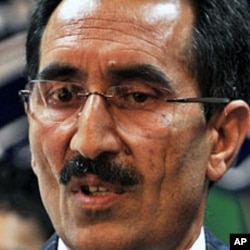The Afghan government continues to face international pressure as it considers new guidelines that may restrict live media coverage of militant attacks. Outgoing special representative for the United Nations to Afghanistan Kai Eide says Afghans are entitled to receive information about events that affect their lives.
Some analysts say last month's high-profile militant attacks in Kabul highlight the fine line local media must walk to satisfy their audience's desire for information without interfering with the situation they cover.
The Afghan government criticized the local media's live coverage of the assaults, saying it endangered both the police and reporters on the scene.
Afghan General Abdul Hadi Khalid tells VOA that he believes the tactical disadvantages of live coverage in these instances outweigh any societal benefits of a free press. He says, usually the group of attackers you see is much smaller compared to the team of militants assembled behind the scenes.
"For example, the two or three or five men who are in front, in back of them there is maybe 15 or 20. One signals, [one] collects the information, one watches the area, one passes the information to each other. By many, many means they pass this information to each other, but mostly by telephone," he said.
He points to the 2008 attack in India's commercial capital of Mumbai. Militants killed nearly 200 people during the three-day assault. Investigations into the attack found evidence that militant coordinators would call the gunmen's mobile phones to pass along information after watching live television news coverage of the scene.
Kai Eide told reporters in his last news conference as the U.N. Special Representative for Afghanistan that people living in a democracy have a right to be informed.
"I firmly believe in the freedom of the media and the rights of the people to receive information about events or developments that affect their lives," he said.
Afghan Journalist's Union president Raheem Mullah Samandar agrees. He says Kabul residents cannot escape the sound of either the explosions or gossip during these assaults.
"'When there is an explosion, they turn on the television, they turn on the radio and they listen what happened. I am looking everywhere for my family. If I have no clear picture of the situation then I will be mad because I am concerned of my relatives; I am concerned of my friends. So I need clear, balanced reporting that is something the media can provide," said Samandar.
Some local journalists say officials with the Afghan intelligence agency warned them they can no longer report these events live from the scene.
But presidential spokesman Waheed Omar denied these reports, saying the government is considering guidelines to protect police and journalists.
"We hope that that can happen through a mechanism that does not restrict anybody's access to information or does not restrict the presence of the media at the scene," he said.
Committee to Protect Journalists Asia Program Coordinator Bob Dietz says the news value of live coverage during events such as militant attacks is vitally important. He says it is up to journalists to agree on their own guidelines to make sure they report these events responsibly.
Dietz points to Afghanistan's neighbor, Pakistan. He says journalists there came up with their own voluntary code of conduct late last year on how to cover militant attacks. They agreed to no longer show live pictures from the scene.
"There are violations at times. People make errors and live TV is live TV and you do not always get it right. But in general, people have come to accept that they do have responsibility. This is not something that was handed down to journalists by security agents. What it was was journalists working together independently to come up with their own guidelines rather than have the government put restrictions on the press," Dietz said.
Samandar says his organization, which represents 2,000 journalists, would be willing to meet with the Afghan government to discuss forming new guidelines.
"It would be better for the Afghan officials to talk to media or to senior journalists or media owners. They can do it if they have some proposals to change the reporting style, so they can propose through the Information [and] Cultural Ministry," he said.
Despite the growing number of media outlets since the fall of the Taliban-led government in 2001, Samandar complains that reporters constantly encounter little or no cooperation from government officials. He says there also have been several instances of the government using the security situation as a reason for restricting media access to certain areas.




